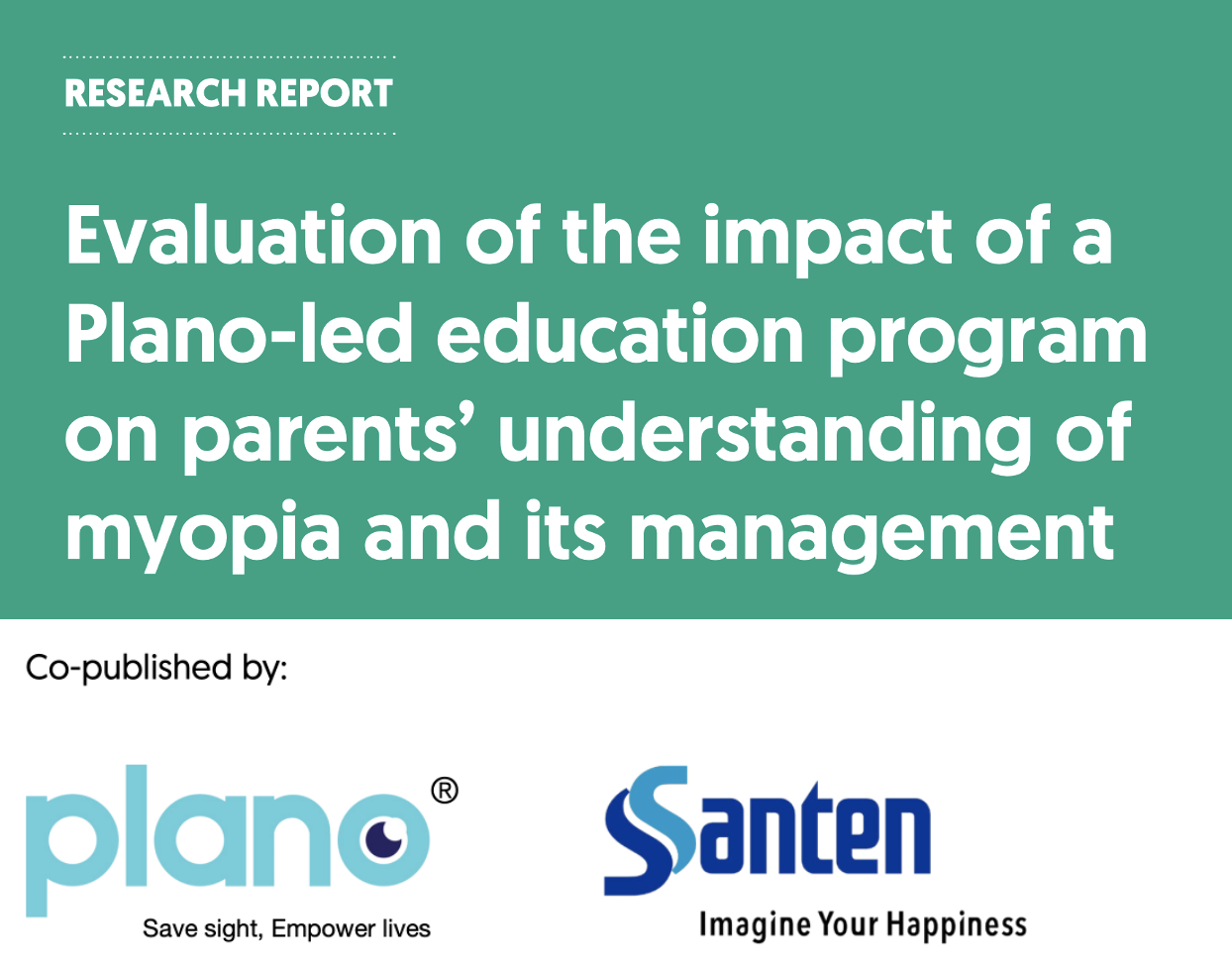Education is a great tool to change behaviours & improve eye health outcomes

The unevenly distributed knowledge of myopia and its management among parents in Singapore and globally has shown the need for evidence-based and authoritative education to encourage tangible changes in behaviour to counter myopia. To address this problem, the Plano team has relied upon its experience and expertise to draw up a pilot education program for parents on myopia to improve eye health outcomes.
The online program comprised of digital materials, including a short educational video as well as a digital booklet pertaining to myopia. The most up-to-date scientific literature on myopia was used to substantiate the content that was produced.
To assess the effectiveness of this pilot education program, the Plano team has conducted a scientific study that investigated the impact of the program on parents’ knowledge and behaviour pertaining to myopia and its management.
How was the study conducted?
Data collection for this study happened between the 24th of May to the 29th of August 2021. Parents living in Singapore aged 21 years or older with at least one child aged 3-12 years old were the targets of this study and were recruited using a social media advertising campaign. Participants had to complete a baseline questionnaire on myopia-related knowledge and behaviour, before watching a 20-minute educational video. These participants then answered the questions regarding myopia again (post-test 1) to compare their knowledge before and after exposure to the program. An electronic booklet summarising the information about myopia was also provided to each participant.
Four weeks after watching the educational video about myopia, participants completed the knowledge and behavioural questions again (post-test 2). Their results were compared with those at baseline and post-test 1 to determine whether any changes in knowledge, if any, persisted long-term. Moreover, the results of the second test were to ascertain if the behaviours or intended behaviours of participants regarding myopia changed after the program.
Findings from the study
The study conducted by the Plano team evaluated the impact that this education program had on parents and revealed that the program improved parents’ knowledge about myopia by 20%. Moreover, the number of parents who knew how to best manage myopia in their children more than doubled after completing Plano’s new education program on myopia. 70% of parents who previously allowed their children to spend more than 2 hours of screen time each day now keep their children’s daily screen time under 2 hours. Also, 90% of parents said that they would take their children for an eye check at least every 1-2 years compared to just 57% before the program.
What do the findings mean?
The findings revealed that Plano’s education program increased parental awareness of the seriousness of myopia and motivated them to take concrete actions to better manage or prevent it in their children’s lives. In the case of the Singapore context, the findings were made all the more significant as Singapore is commonly touted as the myopia capital of the world. Therefore, Singaporean parents could use the findings to encourage proper eye care behaviours in their children while enabling them to continue their academic and other life pursuits. Furthermore, the findings show that educational materials via digital print and media could inspire parents to send their children for more regular eye checkups yearly or once every two years.
The benefits of education to improve health outcomes
Prior to getting exposed to Plano’s educational materials, parents were less likely to get their children’s eyes checked by an eye health professional. Parents were also more likely to encourage their children to spend more time outdoors after learning from Plano’s educational materials that outdoor time and exposure to sunlight could help reduce the chances of children developing myopia. Overall, these findings further demonstrate that Plano’s education program was meaningful and effective to a considerable degree in contributing to public health efforts to mitigate the effects of myopia among the Singapore resident population.
That being said, the findings also displayed areas where Plano’s education program could be further refined to address gaps in specific knowledge domains(namely myopia correction and myopia control). As a result of these findings, Plano’s next program will aim to better differentiate myopia correction and myopia control via video and PDF materials. Also, the differences between myopia correction and control would be better elucidated in the questionnaire for participants.
For more details on the study and how it was conducted, click on this link here.
Whether you are a parent, an eye health provider, a general practitioner, a teacher, or a school administrator looking to raise awareness about myopia prevention and management, contact Plano here to find out more about the educational services and value we provide. We at Plano believe that education is key to improving health outcomes worldwide.
Tools Designed for Healthier Eyes
Explore our specifically designed products and services backed by eye health professionals to help keep your children safe online and their eyes healthy.

